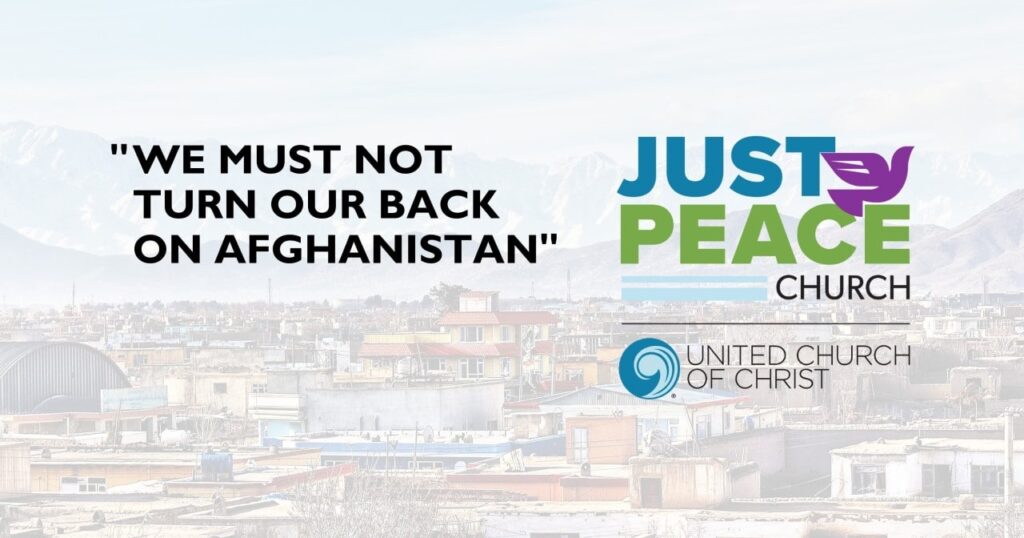We must not turn our back on Afghanistan
UCC Officers statement on Afghanistan
“As he came near and saw the city, Jesus wept over it, saying, “If you, even you, had only recognized on this day the things that make for peace! But now they are hidden from your eyes.” (Luke 19:41-2)
We write with profound grief at the news of the Taliban takeover of Kabul and fall of the Afghan government. Images like those of people clinging to U.S. planes are haunting, and they point to the desperation and fear of our Afghan siblings. After 20 years of military intervention, it is clear that U.S. and international approaches have not brought about a Just Peace for the people of Afghanistan. Twenty more years of the same approach would not have done more. The cycle of violence and endless war had to end. As we have said for years in the United Church of Christ, peace is not the absence of conflict but the presence of justice. We need new approaches to address the root causes of unrest that lead to radicalization and to break the cycle of violence.
To the resilient people of Afghanistan, we grieve with you and stand by you. Your country and lives have already been devastated by years of conflict which have claimed the lives of over 40,000 Afghan civilians and 60,000 military and security officers. The cost you have borne already is unimaginable, and now probable life under Taliban rule brings the likelihood of more violence, brutality, and a constriction of human and civil rights, particularly for your women and girls. We confess our nation’s failure in not centering Afghan leadership more and finding a way to build a durable peace over these twenty years. We repent our contribution to this cycle of violence, and we will not turn away from your suffering. We commit to actively engage our policymakers to see to it that our nation does not abandon you.
To our policymakers, now is not the time for partisan finger-pointing. America’s longest war spanned across four administrations and several changes of power in Congress. We all must collectively own failure to draw this conflict to an end sooner and with a greater possibility for success. While we support the end of U.S. military occupation and operations, we must not turn our back on Afghanistan now or in the years to come. As a nation, we have invested billions in over-militarized approaches that have not succeeded in bringing about the true security or restoration needed for peace. We call for a long-term surge of investment in the “things that make for peace” such as peace-building, humanitarian support, diplomatic engagement, and expansion of access to the U.S. resettlement program to provide refuge for Afghans fleeing violence and persecution.
To our active military, veterans, peace-builders, aid workers, and civil servants who have served and worked to aid Afghanistan, we are grateful for your service and sacrifice. Because of your efforts, many benefited from improved security, education, and a more robust civil society that included the leadership of women. We call on our congregations to extend a compassionate welcome to support you in your grief and trauma. We pray the seeds of hope and progress planted over these last 20 years continue to take root.
As a Just Peace Church, we proclaim with prophetic hope that “peace is possible.” We are not about to stop believing that today. Let us hold on to the hope that peace is possible and commit ourselves not only to keeping our Afghan siblings in prayer, but also to committing: our churches to welcome refugees; our voices to engage in advocacy; our hearts to establish partnerships; and our minds and bodies to support the “things that make for peace.”
Faithfully,
The National Officers of the United Church of Christ
The Rev. John C. Dorhauer
General Minister and President
The Rev. Karen Georgia Thompson
Associate General Minister, Wider Church Ministries and Operations
The Rev. Traci Blackmon
Associate General Minister, Justice and Local Church Ministries

